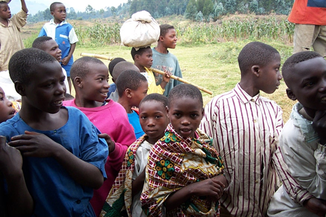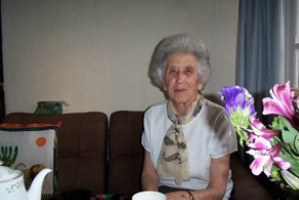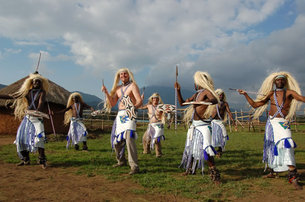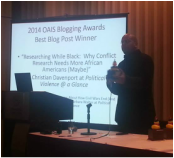
As one leaves an establishment in Rwanda (a restaurant or a hotel) one must invariably prepare themselves for the onslaught of thin, hungry, dirty, scantily dressed but completely adorable children who ask for food or a few francs. The culture at that time was still essentially Francophone – this would change quickly as the RPF presence increased. There is little variation however: there are no fat children, none who look healthy, none who appear clean and none of them is fully dressed. Now, being from New York, I have been approached a million different ways by people in the street: “hey buddy, got a quarter,” “got a light,” “got busfare,” “got my rent in yo pocket,” or “blow for a meal”? You hear everything. I have even been approached by kids who just pull your heart strings. Literally. They just open you up, pull out veins and start playing.
The situation here is compounded by the sheer volume of the issue. There is no isolated child like in New York but rather there is a veritable sea of youth. The onslaught is held back by armed guards, making the place safe for foreigners and those with resources, but once you leave the safety of the establishment – unless you have guards with you or manage to sneak to your vehicle – you have to deal with the kids.
After a while, I could take it, which I was both grateful for and troubled by. After the umteenth child solicitation, a certain degree of callousness overcomes you in Rwanda. I really could not function in any other way because there were simply too many children. The problem was too daunting to contemplate. My colleague Candace could not take it either but she decided that she was going to cave in completely – albeit reacting to only one at a time.
Something that became obvious upon closer observation was that there was a system to the solicitation. While you were approached by a barrage of individuals, if you interacted with one or gave something to one of the children, you were thereafter “owned” by them. If after marking, another kid interacted with the marked outsider, then it appeared that you could be sanctioned by some regulator with a stone, stick or some harsh words.
Candace was marked by a spry little kid with eyes like midnight, a smile like sunlight and a face like the sky (vast, full of potential and haunting). He was named Innocent like many people in Rwanda. You could not help but want to help him.
It was absolutely amazing to see. Upon coming out of any store on the Butare strip, Candace’s Innocent would find her. “Madaam… Madaam…” He would start, tilt his head to the side and smile – hand out. Initially, Candace would give him a franc or two but then she came up with a mini-development strategy. First, she would work on his nutrition: a sandwich instead of a franc, a power bar or a vitamin or two. Second, she would take him for a visit to a doctor – after the buy-in purchased with a meal. Then she would talk about school, over a bottle of water or coke.
Candace was all into his life and he lapped it up. How could he not? They both seemed to need each other and you were warmed by the connection. Amidst all the horrible things one saw in Rwanda, if just one life could be improved, things would be just a little more tolerable. That was the idea at least. The reality was more complex.
You see, the children were also marked. They did not run amok as we thought. Over a few weeks, I managed to sneak in the back of the Made Niggaz Hair Salon and sat in the front with some people I had met before. This allowed me to watch where the kids were hanging out as well as where Candace was coming from.
Watching the street, I could see that there were clics/groups of youth – a gaggle of little capitalistic entrepreneurs. There were older kids as well – between 15 and 20 who seemed to run the pack. The leader would gather the youth at the beginning of the day and pass out assignments. Innocent’s job was seemingly Candace. He would trail her everywhere – walking, running, hiding, waiting – always placing himself where he could be seen (which after you have been marked becomes easy somehow – it’s like there are no longer a hundred kids in a crowd, just yours).
At the end of the day, the kids met again to hand over their goodies to their handlers, from the days catch. There is no joyful enjoyment of the goodies. There is no gracious handover of the piece of bread to grandma back at the old house in the bush. Rather, grandma is dead and there is no house but there is a somber handover and reallocation. After Candace’s giving, all Innocent does is cross the street, turn the corner into an alley and hand over everything he got. On the way back to the street, he might take a nibble but not too much or else he might get caught.
Why give up the goodies? Protection. Fear. Survival. Numbers are the only thing that seem to keep you alive on the streets of Rwanda. You give up to get set up and you get set up to live (not die).
Seeing this whole process once, by mistake, Candace later mentioned to me that “oh, that’s so cute. He’s sharing.” I just looked at her. She missed his submissive demeanor (it looked like someone waiting to get punished), the look on the older kid’s face of anticipation (it looked like some drug addicted fiend waiting for their fix), the eight or so kids that stood around waiting their turn (reminiscent of the first). She even missed Innocent’s look on his face after he gave over this prize (like his lunch money was taken that day, like everyone before it – this was actually pretty accurate but the money was not just for lunch).
At that moment, I realized that we were and were not from the same place. Later, I realized that she needed to see Innocent share. To see anything else would be too hard. I, on the other hand, didn’t need anything but to see what was in front of me. Both of us were likely wrong. I needed more of a filter for all this stuff lest I be overcome by it and Candace needed less of one lest she be underwhelmed.




 RSS Feed
RSS Feed
